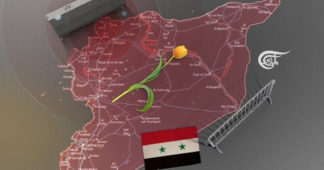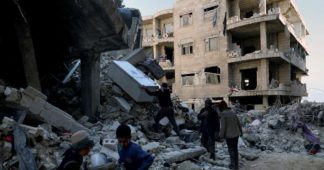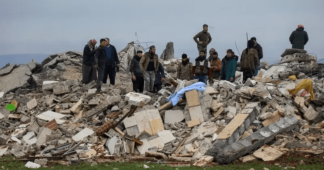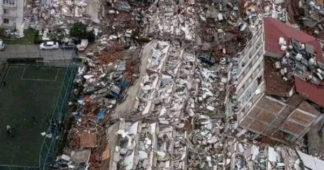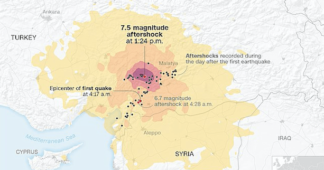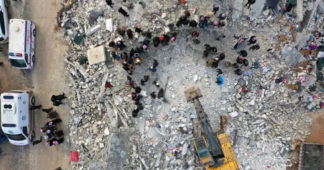Over 5,000 people have been reported dead so far and thousands more injured in Turkey and Syria in a 7.8 magnitude earthquake on Monday
February 07, 2023
The head of the Syrian Arab Red Crescent, Khaled Hboubati, demanded on Tuesday, February 7, that Western countries, specifically the US and its allies, lift their siege and sanctions on Syria so that rescue and relief work can proceed unimpeded, after the country was devastated by a powerful earthquake on Monday.
“We need heavy equipment, ambulances and fire fighting vehicles to continue to rescue and remove the rubble, and this entails lifting sanctions on Syria as soon as possible,” Hboubati said at a press conference on Tuesday, as reported by the Syrian Arab News Agency (SANA).
A powerful earthquake registering a magnitude of 7.8 struck Turkey and Syria on Monday. Over 5,000 people have been reported dead so far. In Syria alone the death toll was 1,602 on Monday. These numbers are only expected to rise as a large number of people are suspected to be still buried under the debris of houses that collapsed in the earthquake and its aftershocks.
Kahramanmaraş, a city in Turkey, was reported to be the epicenter of the earthquake, and the nearby city of Gaziantep—home to millions of Syrian refugees—was reportedly hit the hardest. Relief and rescue operations in Turkey have been affected by bad weather as several of the affected areas have received heavy rain and snowfall on Monday and Tuesday.
Syria’s northern provinces such as Idlib, Latakia, Hama, and Aleppo have also been badly affected by the earthquake. Some of the affected areas in Idlib and Aleppo are under rebel control and densely populated by refugees from other parts of the country.
Though several countries including the US and its allies have extended their support to Turkey in its relief and rescue work, they have refused to extend similar assistance to Syria. The US State Department made it clear on Monday that it was only willing to support some work carried out in Syria by NGOs, but that it would have no dealings with the Bashar al-Assad government. “It would be quite ironic—if not even counterproductive—for us to reach out to a government that has brutalized its people over the course of a dozen years now,” State Department spokesperson Ned Price said, as quoted by Al Jazeera.
On Monday, the Syrian government had issued an appeal to the international community asking for help. Syrian Foreign Minister Faisal Mekdad is quoted in Al-Mayadeen as having said that his government was willing “to provide all the required facilities to international organizations so they can give Syrians humanitarian aid.”
Sanctions hamper relief and rescue work
Claiming that “Current US sanctions severely restrict aid assistance to millions of Syrians,” the American Arab anti-Discrimination Committee (ADC) asked the US government on Monday to lift its sanctions. While it said that the NGOs working on the ground were doing a commendable job, it also said that the “lifting of the sanctions will open the doors for additional and supplemental aid that will provide immediate relief to those in need.”
The US Congress had adopted the so-called Caesar Act in 2020, according to which any group or company doing business with the Syrian government faces sanctions. The act extends the scope of the previously existing sanctions on Syria, imposed by the US and its European allies since the beginning of the war in the country in 2011.
The impact of sanctions on Syria’s health and other social sectors and its overall economic recovery have been criticized by the UN on several occasions in the past. The UN has also demanded that all unilateral punitive measures against Syria be lifted.
Meanwhile, countries such as China, Iran, Russia, Cuba, Algeria, and the UAE, among others, have expressed their willingness to provide necessary support to Syria, and have sent relief materials already.
Al-Mayadeen has however reported that the delivery of international aid, as well as the speed of relief and rescue work in Syria, continue to be impeded as the Damascus international airport is not fully operational at the moment. The airport was hit by an Israeli missile on January 2 and repair work is not yet complete.
Also read
Syria: Western Sanctions Hampering Quake Relief Efforts
We remind our readers that publication of articles on our site does not mean that we agree with what is written. Our policy is to publish anything which we consider of interest, so as to assist our readers in forming their opinions. Sometimes we even publish articles with which we totally disagree, since we believe it is important for our readers to be informed on as wide a spectrum of views as possible.
